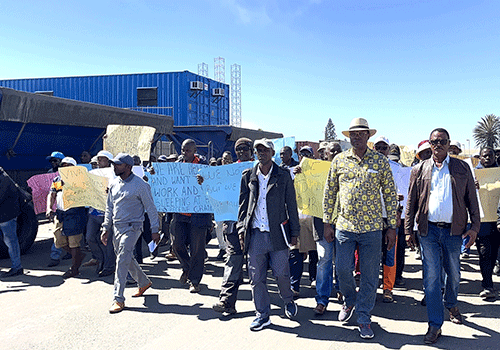WALVIS BAY – McHenry Venaani says the infamous Fishrot corruption scandal has re-emerged as the Governmental Employment Redress Programme (GERP).
Protesting with more than 500 fishers and fishing industry workers on Friday, Venaani questioned the motive behind giving quotas to companies that do not own a single vessel or fishing company to provide jobs to fishers who are supposed to be employed under the government’s re-address programme.
Ironically, Fisheries Minister Derek Klazen renewed contracts for the re-employed fishers on Friday under the GERP programme with companies and the labour ministry. However, Venaani says the programme is not progressive but enables corruption, and President Nangolo Mbumba should intervene, by directly engaging the fishing industry and its workers.
“President Mbumba, you took over the country on the death of the late President Hage Geingob, and you said you’re going to take care of people. I am asking you to come to Walvis Bay to speak to workers, to speak to the fishing industry, to find an amicable solution to the problem,” Venaani appealed during the protest.
Venaani said what is currently happening in the fishing sector is malfeasant greed, corruption, and insider trading. According to him, the fishing industry thinks Namibians do not understand the dynamics of the industry, despite being aware of the corruption taking place in the industry.
“How are you giving quotas to companies that do not have vessels when they clearly do not have the capacity to absorb workers? When the fisher goes to sea, with overtime he can earn N$18 000 to N$30 000, while at home, he receives N$4 000. Yet the same company that is supposed to provide employment makes a profit regardless,” Venaani questioned.
He said companies should be able to make profits but not at the expense of workers who were not supposed to lose their jobs in the first place.
“So, we are demanding President Mbumba, to take charge while there is still time,” he said.
Ongoing Fishrot case
The furious Venaani went on to describe the current situation under the GERP programme as Fishrot number two. He explained that the companies that are directly involved with Fishrot are also involved as their companies got government redress programme.
“How do you address corruption if you’re giving quotas to those who are being accused of corruption? We are standing here because of corruption. And we are saying we cannot solve all the problems in one day. But we must engage with each other in a frank and candid conversation to bring a win-win policy to the industry and the workers.
But the mere fact that the government is shutting its door on your workers, you are giving quotas to companies. These companies are over-profiteering; they are not absorbing people and they are continuing. Even people who do not even have a clue of owning fishing industry got companies,” Venaani said.
Process not sustainable
Klazen admitted on Friday that the GERP programme is not sustainable in the long run given that fishing resources, particularly hake, were diminishing.
He said all affected fishers have
been employed in the hake sector and sub-sectors. Four of the companies specialise in horse mackerel, and the remaining eleven are in the hake fisheries. A total of 18 370 metric tons of Hake quota and 16 500 metric tons of horse mackerel have been awarded to the companies to absorb the 2 483 ex-fishermen.
In 2015, approximately 1 500 fishers lost their jobs due to an illegal strike. They set up camp at Okapale, insisting they would not return until their demands were met. Subsequently, a court case deemed the strike illegal. All these fishers were actively employed at sea.
Some fishers returned to work, while the remainder were replaced by new employees. The question arose: what was the fishing industry to do next? This industry holds significant importance for Namibia. Despite efforts, former employees persisted in camping at Okapale, prompting the hiring of fresh personnel.
These same former workers are now demanding the government reinstate them to their former positions at sea. “To this end, companies are therefore not allowed to replace the employees who resign, go on retirement, or are dismissed, as there are limited employment opportunities within the fishing industry, resulting in non-gainful employment of the fishermen,” Klazen said.
According to him, all these positions they previously occupied have already been filled.
“There exists a feeling of entitlement by the fishermen and disrespect towards employers, resulting in the employees dictating the type of work they want to do, workstations, and continuously threatening employees with mass resignation and mass demonstration, and that quota belongs to them,” Klazen said.


